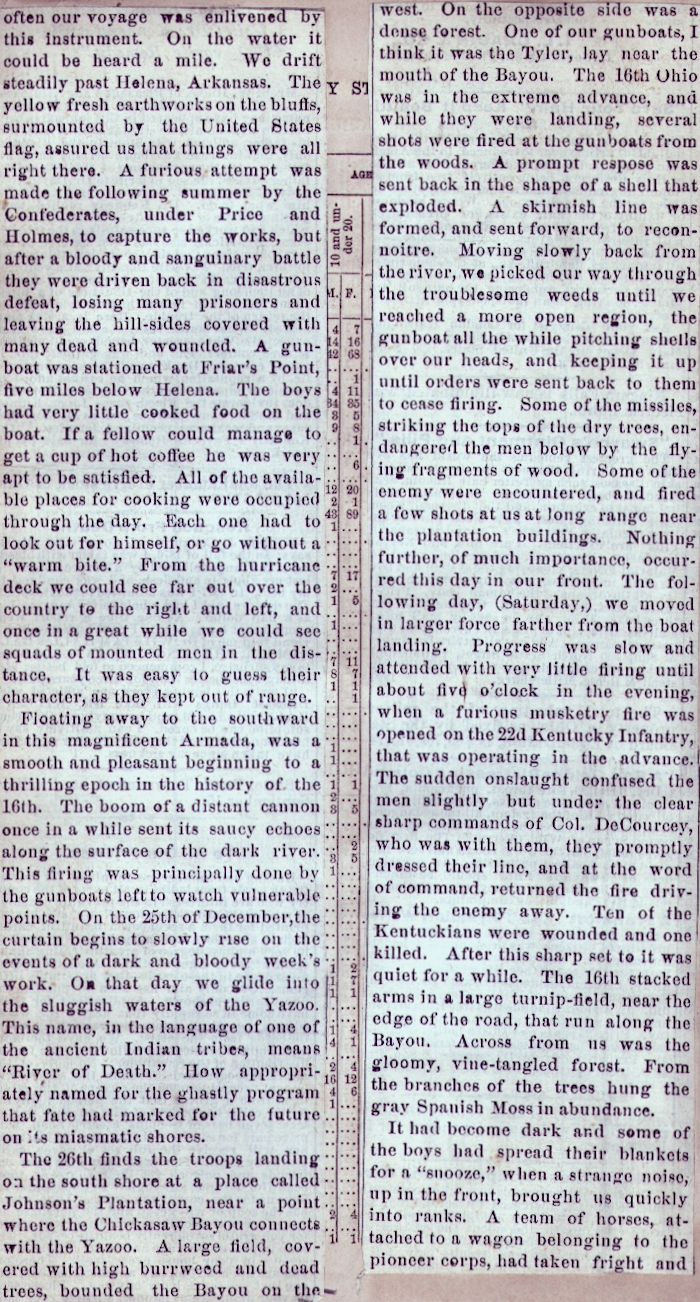| Camp & Field Page 51 | Camp & Field Index Page | 16th OVI Home Page | Camp & Field Page 53 |
The Camp & FieldArticles by Theodore Wolbach |
 Cpl. Theodore D. Wolbach |
The following image is taken from a book titled "Mortality and Statistics of the Census of 1850" in which it is believed retired Captain Rezin H. Vorhes, Company H, pasted over the pages a series of articles written by Cpl. Theodore D. Wolbach, Company E, titled "Camp and Field" and published, by chapter, in the Holmes County (Ohio) Republican newspaper from February 24, 1881 to August 17, 1882. The articles tell the story, in great detail and color, of the 16th OVI, from the inception of the 3-year regiment in October, 1861, through all its camps, battles and marches until it was disbanded on October 31, 1864. The articles pasted in the Vorhes book cover the first 35 chapters, published through October 20, 1881. All the remaining chapters were recently found in a Holmes County library by researcher Rob Garber who obtained copies, performed the transcriptions and provided to this website and which are also presented here, thus providing the complete work by Theodore Wolbach.
Throughout these articles click on the underlined white text for additional details.
The webauthor thanks 16th Ohio descendant Rob Garber for his excellent research on the Camp And Field articles and for performing the tedious digital transcription of those articles found on each page. The transcriptions were made to reflect the original articles verbatim, misspellings and all. Rob is the 3rd great nephew of Capt. William Buchanan, Company F, 16th Ohio, who served in the 90-day regiment as a private, re-enlisting in the three year regiment, and eventually making the rank of Captain of Company F. Thanks Rob!
Page 52 - Chapter 32 - December, 1862
 |
often our voyage was enlivened by this instrument. On the water it could be heard a mile. We drift steadily past Helene, Arkansas. The yellow fresh earthworks on the bluffs, surmounted by the United States flag, assured us that things were all right there. A furious attempt was made the following summer by the Confederates, under Price and Holmes, to capture the works, but after a bloody and sanguinary battle they were driven back in disastrous defeat, losing many prisoners and leaving the hill-sides covered with many dead and wounded. A gunboat was stationed at Friar's Point, five miles below Helena. The boys had very little cooked food on the boat. If a fellow could manage to get a cup of hot coffee he was very apt to be satisfied. All of the available places for cooking were occupied through the day. Each one had to look out for himself, or go without a Floating away to the southward in this magnificent Armada, was a smooth and pleasant beginning to a thrilling epoch in the history of the 16th. The boom of distant cannon once in a while sent its saucy echoes along the surface of the dark river. This firing was principally done by the gunboats left to watch vulnerable points. On the 25th of December, the curtain begins to slowly rise on the events of a dark and bloody week's work. On that day we glide into the sluggish waters of the Yazoo. This name, in the language of one of the ancient Indian tribes, means The 26th finds the troops landing on the south shore at a place called Johnson's Plantation, near a point where the Chickasaw Bayou connects with the Yazoo. A large field, covered with high burrweed and dead trees, bounded the Bayou on the |
west. On the opposite side was a dense forest. One of our gunboats, I think it was the Tyler, lay near the mouth of the Bayou. The 16th Ohio was in the extreme advance, and while they were landing, several shots were fired at the gunboats from the woods. A prompt respose [sic] was sent back in the shape of a shell that exploded. A skirmish line was formed, and sent forward, to reconnoitre. Moving slowly back from the river, we picked our way through the troublesome weeds until we reached a more open region, the gunboat all the while pitching shells over our heads, and keeping it up until orders were sent back to them to cease firing. Some of the missiles, striking the tops of the dry trees, endangered the men below by the flying fragments of wood. Some of the enemy were encountered, and fired a few shots at us at long range near the plantation buildings. Nothing further, of much importance, occurred this day in our front. The following day, (Saturday,) we moved in large force farther from the boat landing. Progress was slow and attended with very little firing until about five o'clock in the evening, when a furious musketry fire was opened on the 22d Kentucky Infantry, that was operating in the advance. The sudden onslaught confused the men slightly but under the clear sharp commands of Col. De Courcey, who was with them, they promptly dressed their line, and at the word of command, returned the fire driving the enemy away. Ten of the Kentuckians were wounded and one killed. After this sharp set to it was quiet for a while. The 16th stacked arms in a large turnip-field, near the edge of the road, that ran along the Bayou. Across from us was the gloomy, vine-tangled forest. From the branches of the trees hung the gray Spanish Moss in abundance. It had become dark and some of the boys had spread their blankets for a |
| Camp & Field Page 51 | Camp & Field Index Page | 16th OVI Home Page | Camp & Field Page 53 |